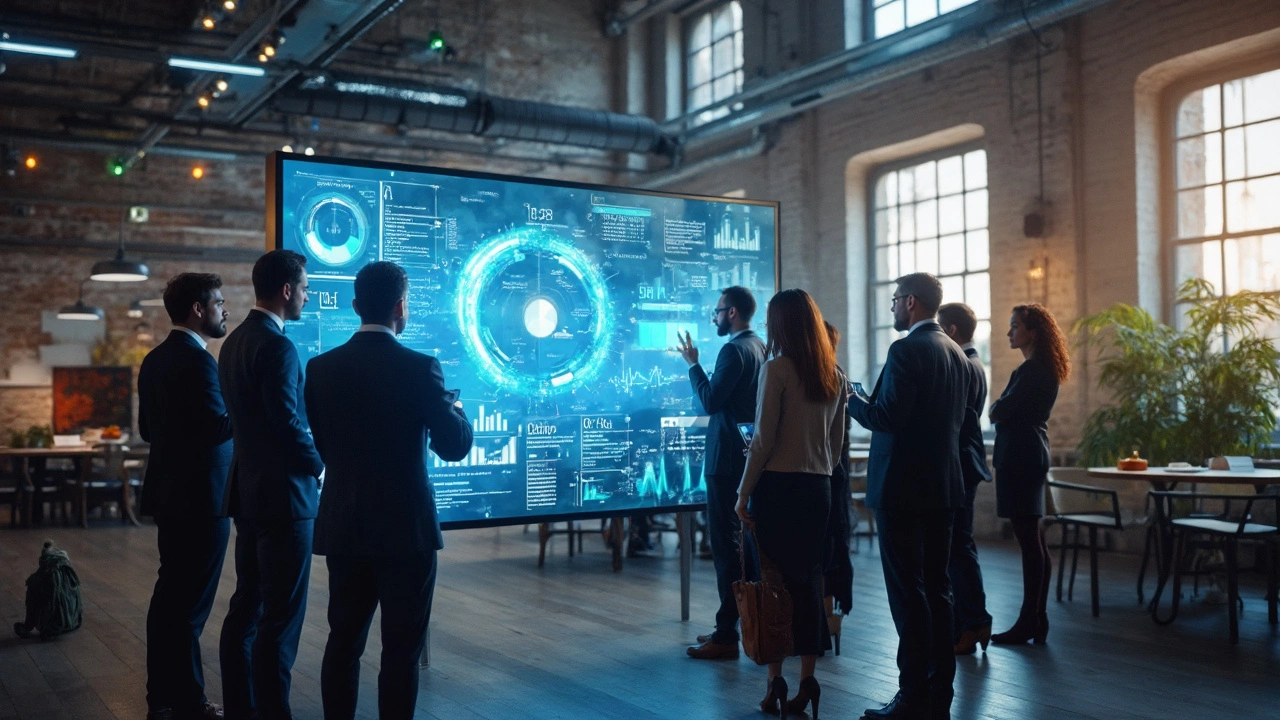How Artificial Intelligence is Changing Human Resources in 2025

Picture this: You send in a job application and barely twenty minutes later, you get an email asking for a virtual interview—with a chatbot. No more waiting weeks for a reply or wondering if anyone actually saw your resume. This is now the reality for many job seekers across the globe. 2025’s HR departments look nothing like what your parents experienced. Artificial intelligence has invaded every corner, from hiring to employee management to goodbye emails on your last day. There’s no ignoring it; AI is flipping the HR industry upside down—and rewiring workplaces in the process. Some people are thrilled, others are skeptical, but everyone’s lives are affected.
AI Tools Revolutionizing Recruitment and Onboarding
So let’s talk about hiring—the place where AI shows its flashiest tricks. Five years ago, HR teams spent endless hours sifting through stacks of resumes, squinting at LinkedIn profiles, and scheduling phone screens with candidates who rarely showed up. Today, those tasks are sliced in half (at least) because AI-powered software does the grunt work. Take HireVue’s video interviewing software, for example—it analyzes facial expressions, word choice, and even voice tone to assess candidate fit. Is it perfect? Nope. But it sorts through thousands of applicants faster and fairer than any human team could. According to LinkedIn’s 2024 Talent Solutions report, 81% of talent professionals have adopted some level of AI-driven screening in their recruitment.
Chatbots, like Olivia and Mya, are another game changer. They text you reminders, answer common questions (“What’s the salary range for this job?”), and schedule interviews in real time. They’re available 24/7 and don’t care if you message at 2 a.m. This always-on support makes applying easier, especially for people with full-time jobs or caregivers who don’t have time for drawn-out email chains. But AI isn’t just saving time. Algorithms sort applications based only on skills, not names or universities, to help remove bias. Blind screenings powered by AI have helped some companies increase the diversity of job finalists by up to 30% compared to old-school methods, according to a 2023 MIT study.
Once a candidate gets hired, the onboarding process gets the AI treatment too. Imagine logging in on your first day, and instead of a thick folder of paperwork, a personalized chatbot walks you through every step. It checks your paperwork, connects you to your team, and answers awkward “where’s the bathroom?” questions—without judgment. Workday and BambooHR introduced virtual onboarding guides powered by AI, reporting a 40% drop in errors and a smoother first week for new hires. Employees can also use AI-driven training modules, meaning they learn exactly what’s needed at their own pace. No more gathering in a stuffy conference room for hours. The machines move things along faster than ever and let HR pros focus on supporting real people instead of chasing paperwork.
Upgrading Workplaces: Automation, Analytics, and Employee Experience
The impact of artificial intelligence doesn’t stop when someone gets hired. Think about payroll processing, vacation requests, even tracking employee happiness. Mountains of data, right? Just five years ago, HR teams used clunky spreadsheets and endless forms—nightmarish stuff. Now, automation handles the boring stuff. Payroll can run itself through AI platforms, flagging any weird inconsistencies so employees get paid right without manual audits. ADP and Gusto’s AI payroll solutions flag errors before they happen—saving small businesses and giant corporations untold hours and cash.
Analytics have gone from buzzwords to actual tools. AI-powered HR dashboards offer real-time insights about employee satisfaction, turnover risks, who’s overdue for a raise, or who might be planning to quit. Culture Amp and Peakon have created dashboards that read through survey responses, chat logs, and performance reviews then highlight which departments are burning out or which managers are doing great. Instead of acting once a year at performance review time, HR can react before issues fester into resignations or full-on mutiny.
Ever feel weird giving honest feedback, not knowing if anyone is paying attention? Many companies now use AI to organize and respond to feedback quicker. Some AI assistant bots like “Leena AI” solve employee issues directly or escalate them to HR staff. Real, human-driven improvement plans are designed faster, making workplaces less frustrating for everyone. Web giants like Google and Microsoft use this tech to watch sentiment shifts in their huge workforces, giving managers monthly (not yearly) feedback loops. This lets them fix grievances and keep talented people happy—before they jump ship.

Challenges and Downsides: Bias, Privacy, and Human Touch
No technology arrives without headaches. AI in HR is a shiny tool, but there are times it can backfire. First: automation bias. If you trust an algorithm blindly, you risk letting software make lazy assumptions. In 2023, a big-name retail chain got heat for an AI that screened out candidates with gaps in their resumes—like parents who were home for childcare or gig workers juggling side hustles. That didn’t go over well. AI is only as good as the data it’s fed, and if historical company data is biased, the system will echo those same biases. So, humans still need to keep an eye on what the algorithms are doing. The best companies regularly audit AI decisions to make sure they’re still fair—and they publish the results, even when it’s embarrassing.
Then, there’s privacy. AI platforms chew on massive amounts of personal data: resumes, chat logs, medical notes, and more. Who controls this data? In January 2025, the EU put out stricter rules around workplace AI, forcing companies to tell employees how algorithms influence job decisions. Some U.S. states are now following suit. If a bot recommends you for layoff, you now have the right to challenge the decision and see how that choice was made. Savvy employers get ahead by being open about their tools. They give employees options to “opt out” or review what’s collected about them, helping them earn trust instead of paranoia.
The question that keeps popping up: Does AI take away too much of the “human” in human resources? Robots might be fast and efficient, but can they spot someone who’s quietly struggling at home? Or pick up on office drama simmering just below the surface? Machines don’t have empathy. The smartest HR leaders don’t hand off the entire operation to robots; they let AI take care of the repetitive stuff and step in for the hard, personal conversations. A recent SHRM poll found 63% of employees still value talking to a live person for sensitive issues—no chatbot can match real empathy yet. If you work in HR or plan to, remember: the future belongs to those who use tech as a tool, not a crutch.
Tips for Thriving in the AI-Powered HR World
So how do you survive (and even thrive) when AI is flipping your work upside down? Here are some concrete strategies for both HR pros and employees. First up: training. If you’re in HR, don’t wait for your boss to send you to an “AI for Beginners” course. Sites like Coursera, LinkedIn Learning, and Udemy roll out up-to-date classes on AI in HR. Learn what these systems do, how they make decisions, and their limits. Knowing the tech gives you an edge. Next, always check what your AI systems are spitting out. Audit results for hidden biases and weird patterns. Trust the bots for tedious work, but trust your gut for the final call.
If you’re a job seeker, expect video and chatbot interviews—even for entry-level jobs. Practice your responses on camera, and check your LinkedIn for weird typos, since algorithms flag those quicker than any human would. Don’t try to game the AI—most screening tools change their algorithms monthly. Instead, focus on listing concrete skills, recent projects, and using clear language that matches the job ad. Some tools like Jobscan can show you how well your resume matches today's AI-powered screening software.
One overlooked tip: Always ask potential employers about their use of AI in the hiring process. Good companies are upfront and happy to explain. Transparent policies are now a green flag. During onboarding, take advantage of any self-paced, AI-powered learning modules. They’re often more helpful (and less boring) than old-school seminars. And yes, if an AI tool decides something big about your future—like a promotion or layoff—don’t be afraid to ask a real person why. You have rights.
- Prioritize learning how your systems work, not just what they do.
- Regularly check for (and challenge) bias in automated decisions.
- Don’t ignore the human angle—sometimes, a chat is better than a form.
- Push for transparency about how your data is used at work.
- Prepare for AI in both interviews and day-to-day HR interactions.
Love it or hate it, artificial intelligence is now the backbone of HR. Some people will miss the human-only days, others will never look back. If you can ride the wave—being smart about both tech and empathy—you’ll have a front-row seat to the workplaces of the future.